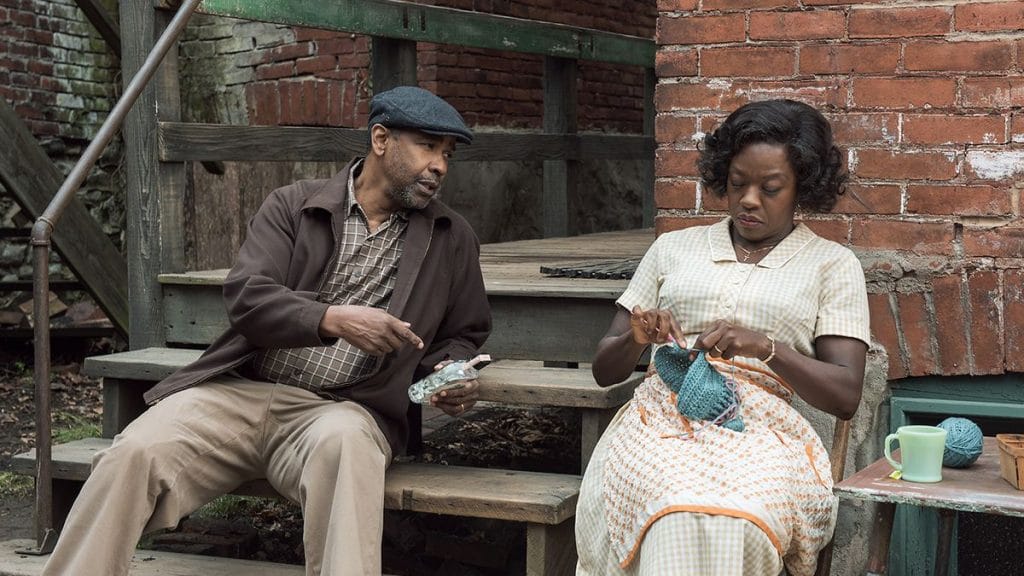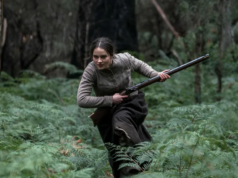Like a long-filmed play, Fences at least relies on some outstanding performances that compensate for the film’s lack of visual inventiveness
Fences (2016)
Directed by Denzel Washington. Screenplay by August Wilson, based on his play “Fences.” Starring Denzel Washington, Viola Davis, Stephen Henderson, Jovan Adepo, Russell Hornsby, Mykelti Williamson and Saniyya Sidney.
As many people may well remember, there was a lot of discussion last year surrounding the lack of diversity and racial representation at the Academy Awards. This year, like a sign that there are people trying to correct that mistake, not one but three films centered on African Americans are nominated for Best Motion Picture of the Year (although women, on the other hand, are still not represented at all among the nominees). These films, however, are so different from one another, in structure, style and even tone. But unlike Moonlight, for instance, which is also based on a play and yet manages to be essentially cinematic in the way it uses its visuals to express more than just words, Fences is verbose and feels like a long-filmed play.
Written by August Wilson, who died in 2005 but had (nearly) completed the screenplay based on his own play, Fences takes place in 1950s Pittsburgh and follows African American waste collector Troy Maxson (Denzel Washington) who once had dreams of becoming a professional baseball player but was considered too old (though he strongly believes that he was passed over due to his color). Now he lives with his wife Rose (Viola Davis) and their son Cory (Jovan Adepo), trying to raise his family the way he can. But when Rose tells him that Cory is being scouted by a college football team, Troy decides to ruin his son’s chances of achieving the success he never did, claiming he doesn’t want to see him fail (like him) but obviously doing so out of jealousy too.
Relying on a constant dialogue exchanged between the characters, Fences gives away its theatrical origins right from the first scene. Not that this is a problem per se, but the general rule in Cinema is “show, don’t tell,” and so it can be tiring after some time to see so much exposition in a film that doesn’t try to do anything more cinematic. The production design is quite basic, recreating a few Pittsburgh streets of the 1950s with its old cars and classic shades of brown in a modest way. The cinematography is discreet and unobtrusive, using mostly fixed shots, while Denzel Washington’s invisible direction basically tells us we should focus our exclusive attention on the dialogue, the performances and not much else.
With respect to that, at least, the film doesn’t disappoint. Denzel Washington offers an intense performance and couldn’t be more comfortable in his role after having played it 114 times on Broadway. Troy is portrayed as a man of expansive personality who likes to tell stories about the time when he defeated death. He drinks heavily and feels guilty for having purchased his home using the payout the government gave his brother Gabriel Maxson (Mykelti Williamson) after a head injury in the war left him mentally impaired. Hard-headed and proud, Troy believes in responsibility and that it is his duty to harden Cory for a hard life as a black adult. “I’m the boss,” he says, not realizing he is just as abusive as his father was — and Washington shines in a scene when he talks about the abuse he endured and his own crooked past.
Viola Davis is also exceptional, playing a devoted wife who stands by her husband even if she is aware of his terrible flaws. Rose’s expression when Troy lets her in on some shocking news carries a lot of different feelings and is only matched by a revealing monologue in the end that should earn her every award this season. “Some people build fences to keep people out, and other people build fences to keep people in,” Troy’s best friend Jim Bono (Stephen Henderson) tells him, about the fence Rose asked Troy to build around the house. Rose wants to keep her family in, and it is touching to see her frustration and sadness after she realizes she gave eighteen years of her life to a marriage and was rewarded in the worst way possible.
As Cory, Jovan Adepo does a remarkable job too, and the same can be said about Russell Hornsby, who plays Troy’s estranged son Lyons. There is a great dialogue between the two brothers at the end of the film that impresses for the good acting, and Adepo finds the perfect tone for his character as a determined young man who refuses to be like his father. The hostility between father and son escalates into a depressing fight scene that only made me hate Troy even more — and I really don’t like how Fences tries in the end to force an almost impossible sympathy on us towards such an unloving, embittered and horrible person.
Losing some of its strength and dragging a bit with a rather long runtime, Fences becomes tiring after a while. But despite that and a cheesy ending in which a bunch of people look dumbfounded to the sky, the film has some outstanding performances that, combined with Wilson’s material, are sufficient to deserve our attention.





